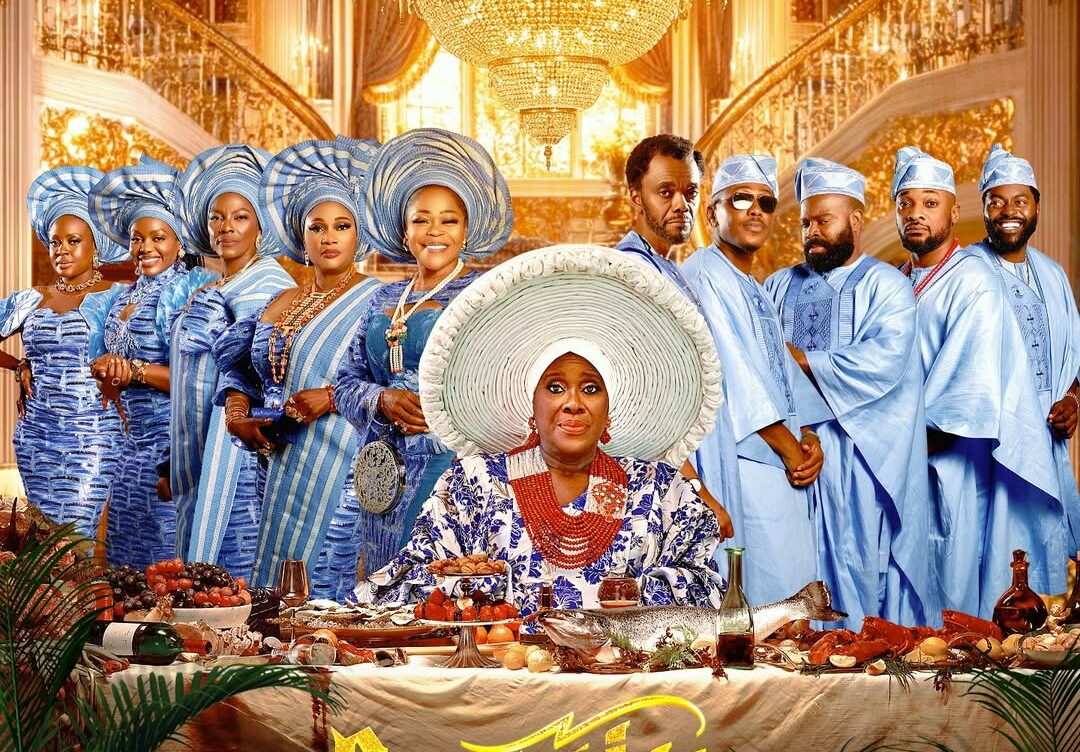In Family Brouhaha, what we have is a group of people who are fundamentally badly-behaved in a film where nobody grows and nothing changes from the start to the finish.
By Vivian Nneka Nwajiaku
One too many times in Nollywood, we leave underwhelming films with the knowledge, at least, that we can understand the intention despite the poor execution. Not with Family Brouhaha (2025), though, a film so noisy, hectic, and purposeless that at a runtime of only an hour and a half, it still feels like a very long, bad skit.
Directed by Femi Adebayo in his debut as a sole director, and written by Oyinlola Lasisi, who also produced the film (and is credited in a minor supporting role), Family Brouhaha follows the Braimoh clan, an ultra-rich family with business interests in cocoa production and exports.
The family is headed by the matriarch, Dr Mrs Feyi-Sewa Braimoh (Joke Silva), with the assistance of her sister-in-law, Joke (Tina Mba). Dr Braimoh has three children, Mofe (Wale Ojo), Abolanle (Shaffy Bello), and Abiola (Adekanla “Deza de Great” Desalu), each of whom is married.
And there are a bunch of grown Braimoh grandchildren (Tayo Faniran, Timini Egbuson, Uzee Usman, Gabriel Afolayan, and Seilat Adebowale) who are too difficult to keep track of, although they are actually not that many.
With the matriarch’s eightieth birthday approaching and the family wallowing in disunity, she decides to do what she believes her late husband would have done: summon her children and grandchildren to a family gathering at their Abuja beach house. But as they will not come unless compelled to, she takes Joke’s advice and cuts off their access to the family funds.
And so, Family Brouhaha begins. The children and grandchildren of the Braimoh dynasty cannot buy their heart’s desires no matter how loudly they threaten their bankers on the phone, so they hop on the family’s private jet and make their way to Abuja.

From the moment they get on the jet, we’re hit with all sorts of empty arguments and just plain, boundless noise, from the dialogue—if it can be called that—to the soundtrack. When they arrive at the beach house, they continue with the noise and petty quarrels, even to the point of vulgarity. When they sit at a dinner that’s reserved strictly for family, the presence of friends and unmarried romantic partners leads to another bout of noise, squabbles, and vulgarity.
Sometimes, their aging mother successfully shuts them up with the loudest and most intense voice she can muster up. Most times, however, it is their aunt, Joke, who has to scream so much that it would be surprising if Mba walked off the set of Family Brouhaha with her voice intact.
There is too much shouting and too much shouting to shut down the shouting, and if I had a dime for every time someone says “shut up” in this film, I would be richer than the Braimohs.
If only the shouting had some meaning to it, something to make it worth a temporary hearing loss, it might be bearable. But the dialogue is so crass and so dedicated to reciting motivations and backstories, relationship histories, and even plot points.
And all the infighting, quarrels, and scandalous reveals are either meaningless or have no real impact, just another throwing about of words and actions to remind you that you’re watching a dysfunctional family.
But we have had dysfunctional families, even in Nollywood, that have a rich essence to their dysfunction. With Biodun Stephen’s Introducing the Kujus (2020), in particular, we had a dysfunctional and quarrelsome but incredibly relatable family in a film that said a lot about the complexity of family while making space for growth and rediscovery.
In Family Brouhaha, what we have is a group of people who are fundamentally badly-behaved in a film where nobody grows and nothing changes from the start to the finish.

Family Brouhaha is rife with incidents of moral deficiency, from scams to countless episodes of infidelity, that either occur just to occur or are just abandoned midway. People make so much ado about challenging their matriarch, but that challenge never happens. People eavesdrop to do nothing with the information they obtain. People are caught in scandalous situations that never come up again. And secret heirs are revealed just to mislead an audience that could not possibly care less.
Worse still, somewhere in the middle of all the noise and chaos, Family Brouhaha forcefully picks up a graphic child sexual abuse backstory as an explanation for the family’s disunity, and tries to build an emotional core on it, with a doctor (played by Yemi Shodimu) given a few vague words to say about healing.
And then the film does nothing with that heavy subject, except to use it as a justification for the victim’s objectification of women and his own abuse of the power he has over the female domestic staff.
The only pockets of breathing space we get in this film are the scenes when Dr Braimoh sits or paces or cries herself to sleep as she worries and struggles with the realisation that everything she and her husband built will go to waste. Quiet music accompanies these moments—saxophones and soulful soundtracks—the only source of sanity in Family Brouhaha.
We almost get some peace and quiet towards the end, when the matriarch’s birthday party finally comes to pass. So much time is spent on the party sequence that we might as well get dressed in their lovely asoebi and join the party. But as peaceful as it seems, we are already so stressed that we keep waiting for the other shoe to drop.
And it does drop, with physical fights breaking out in and out of the party hall. Surprisingly, they break out noiselessly, a live band singing in the background while Braimoh mouths move without sound. We have no idea what triggers most of the fights. All that matters is that chaos has struck again, and the matriarch is now in a precarious state.
You would not believe it, but Chief Daddy 2 (2022) had more of a point to make than Family Brouhaha does, and I described Chief Daddy 2 as an absurd, unapologetically pointless movie.

Chief Daddy 2’s dysfunctional family was even funnier than the Braimohs. The only comedy in Family Brouhaha is Isaac “Layi Wasabi” Olayiwola’s skit, where he plays Dr Braimoh’s new lawyer, but not even he can elevate the film. Especially not when he has to share space with Charles Okocha’s problematic cringefest of a skit in the last few minutes.
If there is one completely good thing about Family Brouhaha, it is the friendship between Dr Braimoh and Joke. It touched me to see a wholesome portrayal of female friendship between sisters-in-law, especially in a dysfunctional film about a dysfunctional family. I waited for the other shoe to drop here, too, but it never did.
Adebayo had an impressive directorial debut in Netflix’s limited series, Seven Doors (2024), a serious contender for the Best Director and Best Scripted Series at this year’s Africa Magic Viewers’ Choice Awards (AMVCA), where it racked up more nominations than any other project.
This is an unexpected return to the director’s chair. Family Brouhaha was an exhausting watch. So exhausting that when it finally came to an end, with an absurd plot twist that had a character saying “checkmate”, it really did feel like checkmate, like I had just suffered a major loss.
Rating: 1/5
(Family Brouhaha is showing in Nigerian cinemas.)
Vivian Nneka Nwajiaku is a writer, film critic, TV lover, and occasional storyteller writing from Lagos. She has a master’s degree in law but spends most of her time reading about and discussing films and TV shows. She’s particularly concerned about what art has to say about society’s relationship with women. Connect with her on Twitter @Nneka_Viv



